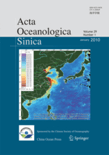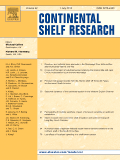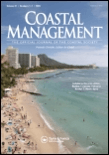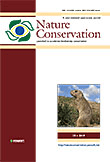
JOURNAL OF COASTAL CONSERVATION
Scope & Guideline
Inspiring action for thriving coastal ecosystems.
Introduction
Aims and Scopes
- Coastal Ecosystem Management:
The journal emphasizes the sustainable management of coastal ecosystems, including mangroves, wetlands, and coral reefs, integrating ecological principles with conservation strategies. - Impact Assessment and Remote Sensing:
A core area of focus is the assessment of environmental impacts on coastal regions, utilizing remote sensing technologies and geospatial analysis to monitor changes and inform management practices. - Socio-Ecological Studies:
Research explores the interplay between human communities and coastal ecosystems, including socio-economic factors, public perceptions, and community engagement in conservation efforts. - Climate Change Adaptation and Resilience:
The journal addresses the challenges posed by climate change to coastal areas, promoting research on adaptation strategies and resilience-building for communities and ecosystems. - Biodiversity and Conservation Strategies:
It highlights studies on biodiversity within coastal ecosystems and develops strategies for the conservation of threatened species and habitats. - Policy and Governance:
The journal contributes to discussions on governance frameworks, policies, and practices that affect coastal conservation and sustainable development.
Trending and Emerging
- Climate Change and Coastal Vulnerability:
There is an increasing focus on assessing the impacts of climate change on coastal vulnerabilities, including sea-level rise, extreme weather events, and their implications for coastal communities. - Nature-Based Solutions:
Research on nature-based solutions, such as the restoration of mangroves and wetlands for coastal protection and biodiversity enhancement, is gaining traction as a sustainable approach to managing coastal resilience. - Citizen Science and Community Engagement:
The journal is seeing a rise in studies that involve citizen science initiatives, highlighting the importance of community involvement in monitoring and conservation efforts. - Technological Innovations in Monitoring:
Emerging themes include the use of advanced technologies like UAVs and remote sensing for monitoring coastal changes, reflecting a trend towards integrating technology in environmental research. - Plastic Pollution and Marine Debris:
There is a growing emphasis on research addressing plastic pollution, its sources, impacts, and management strategies in coastal environments, aligning with global sustainability efforts. - Integrated Coastal Zone Management (ICZM):
The journal is increasingly publishing work on integrated coastal zone management approaches, focusing on the collaboration between various stakeholders to address complex coastal issues.
Declining or Waning
- Historical Coastal Studies:
There has been a noticeable decrease in studies focusing on historical coastlines and traditional ecological knowledge, as the journal shifts towards contemporary issues and urgent environmental concerns. - Marine Tourism Impacts:
While marine tourism has been a critical area of research, recent publications show a reduced emphasis on this topic, possibly due to a growing focus on conservation over tourism management. - Traditional Fisheries Management:
Research specifically targeting traditional fisheries practices is becoming less frequent, as the journal increasingly concentrates on broader sustainability and governance issues in fisheries. - Microbial Studies of Coastal Ecosystems:
Studies focused solely on microbial dynamics within coastal ecosystems appear to be less common, indicating a potential shift towards more holistic ecosystem assessments. - Physical Oceanography:
Research concentrating on physical oceanographic processes in coastal areas seems to be declining, with a stronger emphasis now on ecological and socio-economic dimensions.
Similar Journals

OCEAN DYNAMICS
Transforming Understanding of Oceanic PhenomenaOCEAN DYNAMICS is a premier peer-reviewed journal published by Springer Heidelberg, dedicated to advancing the field of oceanography. With an ISSN of 1616-7341 and an E-ISSN of 1616-7228, the journal has established itself as a key resource for researchers and professionals interested in the dynamic processes of the world's oceans. As of 2023, it holds an impressive Q2 category ranking in Oceanography, placing it among the top journals in its field (Rank #34/145, 76th percentile in Earth and Planetary Sciences). Although operating under a traditional publishing model without open access options, OCEAN DYNAMICS continues to provide valuable insights and a platform for innovative research, boasting coverage from 2001 to 2024. Researchers and students alike will benefit from this journal's commitment to showcasing cutting-edge studies that enhance our understanding of oceanographic phenomena.

Latin American Journal of Aquatic Research
Fostering Collaboration for Aquatic Research ExcellenceLatin American Journal of Aquatic Research (ISSN: 0718-560X) is a distinguished scholarly publication that has been paving the way for aquatic science research since its transition to Open Access in 2008, allowing unhindered access to diverse scientific inquiries conducted in Latin America and beyond. Published by Pontificia Universidad Catolica de Valparaiso in Chile, this journal serves as a vital platform for researchers and practitioners in the fields of Aquatic Science and Oceanography. With an esteemed Q3 ranking in both categories as of 2023, it is dedicated to disseminating high-quality research findings that address pressing ecological and biological challenges. The journal’s reach and impact are reflected in its Scopus rankings, where it stands at the 36th percentile in Oceanography and the 35th percentile in Aquatic Science. Researchers, professionals, and students alike will find valuable insights and data-driven articles that further the understanding of aquatic ecosystems, making it an essential resource for ongoing studies and future innovations.

ACTA OCEANOLOGICA SINICA
Bridging Research and Marine ConservationACTA OCEANOLOGICA SINICA, published by SPRINGER, stands as a significant voice in the fields of Aquatic Science and Oceanography, contributing vital research and insights since its inception in 1985. With an ISSN of 0253-505X and an E-ISSN of 1869-1099, this journal maintains a strong international focus, delivering high-quality peer-reviewed articles that address pressing marine and freshwater environmental issues. Although it operates under a subscription model, its Q3 ranking in both Aquatic Science and Oceanography demonstrates its solid standing within Scopus, placing it in the 48th and 44th percentiles respectively. The journal aims to foster knowledge exchange and collaboration among researchers, professionals, and students by providing a platform for innovative studies and comprehensive reviews. With a dedicated editorial board and a commitment to advancing scientific understanding, ACTA OCEANOLOGICA SINICA serves as an essential resource for anyone engaged in the study of oceanographic phenomena and aquatic ecosystems.

MARINE AND FRESHWATER RESEARCH
Connecting research with real-world impact.Marine and Freshwater Research is a prestigious journal published by CSIRO PUBLISHING that serves as a key platform for the dissemination of cutting-edge research in the fields of Aquatic Science, Ecology, and Oceanography. With an impactful presence since its inception in 1948, the journal provides critical insights into the dynamics of freshwater and marine ecosystems, promoting interdisciplinary approaches that contribute to our understanding of biodiversity and sustainability. Currently ranked in the Q2 category across major scientific domains, including Ecology and Aquatic Science, it enjoys a robust academic reputation supported by impressive Scopus rankings, such as Rank #66/247 in Aquatic Science and Rank #44/145 in Oceanography, reflecting its high citation impact and relevance. While offering a subscription-based access model, the journal remains dedicated to fostering dialogue and innovation within the scientific community, aiming to bridge the gap between research findings and practical applications in environmental management. Located in Australia, Marine and Freshwater Research is an essential resource for researchers, professionals, and students dedicated to exploring the complexities of aquatic ecosystems and advocating for their preservation.

CONTINENTAL SHELF RESEARCH
Diving Deep into Coastal Conservation and PolicyCONTINENTAL SHELF RESEARCH, published by PERGAMON-ELSEVIER SCIENCE LTD, is an esteemed journal within the fields of Aquatic Science, Geology, and Oceanography, reflecting a compelling intersection of these disciplines. Since its inception in 1982, this journal has served as a premier platform for disseminating cutting-edge research relevant to the continental shelf ecosystem, including its geological features, biological resources, and physical processes. With a Category Quartile ranking of Q1 in Aquatic Science and prominent Q2 standings in Geology and Oceanography, it is recognized for its rigorous peer-review standards and impactful contributions, evidenced by its respective rankings in Scopus. Researchers and professionals are encouraged to engage with the journal's array of high-quality articles that not only enhance scientific understanding but also inform policy and conservation efforts. This dedication to advancing knowledge makes CONTINENTAL SHELF RESEARCH an essential resource for those passionate about marine and coastal studies in the United Kingdom and globally.

Indian Journal of Geo-Marine Sciences
Charting New Territories in Oceanographic StudiesThe Indian Journal of Geo-Marine Sciences, published by the NATIONAL INSTITUTE OF SCIENCE COMMUNICATION & INFORMATICS (NISCAIR), serves as a vital platform dedicated to the dissemination and advancement of knowledge in the field of marine and geosciences. As an open-access journal, it allows for improved visibility and accessibility of research findings to a global audience, enabling researchers, professionals, and students to share insights into oceanography and related disciplines. With a publication history spanning from 2007 to 2010 and continuing from 2012 to 2024, it has established itself within the academic community as a reliable source of innovative research, despite being classified in Q4 of Oceanography and holding a Scopus rank that places it in the 27th percentile. This journal is particularly relevant for those investigating marine ecosystems, geological oceanography, and their interconnections, thus playing an essential role in fostering understanding and communication within this important area of scientific inquiry.

COASTAL MANAGEMENT
Bridging theory and practice in coastal management.COASTAL MANAGEMENT is a distinguished journal published by Taylor & Francis Inc, specializing in the interdisciplinary field of environmental science with a focus on coastal ecosystems. Since its inception in 1987, this journal has provided a critical platform for researchers and practitioners to disseminate innovative studies and practical solutions related to coastal management challenges. With an impressive Q2 ranking in both Environmental Chemistry and Environmental Science categories, it is recognized for its significant contributions to the field, evidenced by its Scopus ranking of #61/233 in General Environmental Science and #60/147 in Environmental Chemistry. Although open access options are not available, the journal maintains a broad readership within the academic community through its comprehensive exploration of coastal issues. With a commitment to advancing knowledge and fostering collaboration among experts, COASTAL MANAGEMENT plays a pivotal role in shaping sustainable practices and policies essential for the conservation and stewardship of our vital coastal environments.

Jurnal Ilmu dan Teknologi Kelautan Tropis
Transforming marine research into actionable knowledge.Jurnal Ilmu dan Teknologi Kelautan Tropis (ISSN: 2087-9423, E-ISSN: 2085-6695) is a premier scientific journal published by the Indonesian Oceanologists Association in collaboration with the Bogor Agricultural University, specifically from the Department of Marine Science and Technology. This journal is committed to advancing the field of tropical marine science, publishing high-quality research that addresses pressing issues in oceanography, marine ecosystems, and sustainable practices in tropical regions. By facilitating open access to valuable scientific knowledge, Jurnal Ilmu dan Teknologi Kelautan Tropis aims to engage researchers, professionals, and students alike, fostering collaboration and innovation in marine research. Located in the picturesque region of Bogor, West Java, Indonesia, this journal serves as a vital platform for disseminating findings that contribute to the conservation and effective management of tropical marine resources.

Nature Conservation-Bulgaria
Innovating conservation strategies through impactful scholarship.Nature Conservation-Bulgaria is a distinguished peer-reviewed journal published by PENSOFT PUBLISHERS, dedicated to advancing the field of conservation through a comprehensive exploration of ecological and environmental issues. Since its inception in 2012, this Open Access journal has cemented its position as an essential resource for researchers, professionals, and students interested in the complex dynamics of ecosystems and biodiversity conservation. With an impressive Q2 ranking in both the Ecology, Evolution, Behavior and Systematics and Nature and Landscape Conservation categories, the journal showcases significant contributions to ecological scholarship, reflecting its commitment to vibrant and impactful research. The journal's coverage extends from 2012 to 2024, and it is indexed in Scopus, where it ranks in the 63rd percentile for key areas within Agricultural and Biological Sciences. With its base in Bulgaria, the journal also aims to highlight regional conservation efforts while maintaining global relevance, making it an indispensable platform for disseminating vital knowledge and fostering collaboration across the scientific community.

Maritime Studies
Illuminating the Socio-Economic Tides of the SeaMaritime Studies is a premier journal published by Springer Heidelberg, focusing on interdisciplinary research in the fields of aquatic sciences, development, geography, and environmental management. With an ISSN of 1872-7859 and an E-ISSN of 2212-9790, the journal serves as a critical platform for the dissemination of innovative studies that advance our understanding of maritime environments and their socio-economic implications. The journal boasts an impressive Q2 ranking across multiple categories, including Aquatic Science and Geography, underscoring its significance in the academic community. With a commitment to fostering dialogue on maritime policy, management, and technological advancements, Maritime Studies is essential reading for researchers, policymakers, and students dedicated to promoting sustainable practices in ocean and waterway resource management. As this journal converges between 2012 to 2024, it continues to uphold the highest academic standards, facilitating impactful research that shapes the discourse in marine studies and beyond.